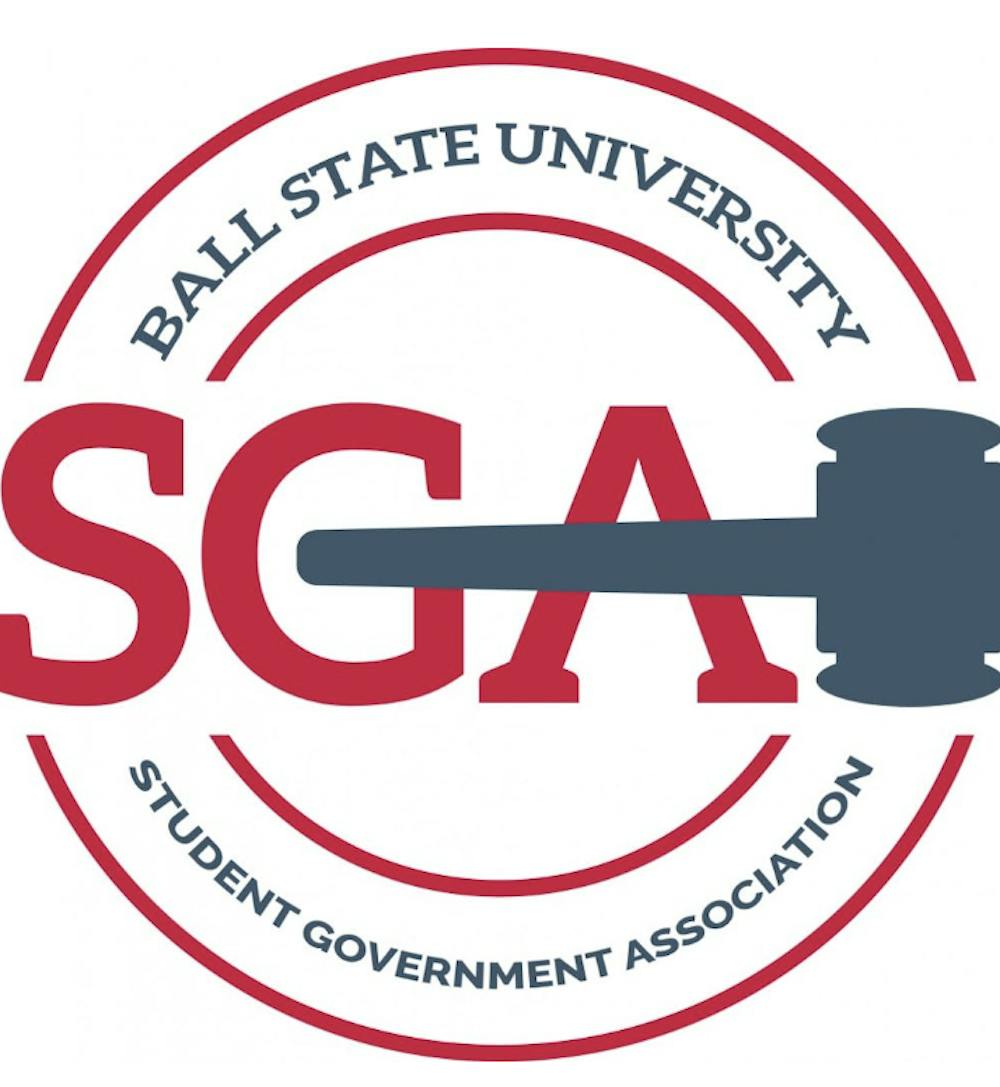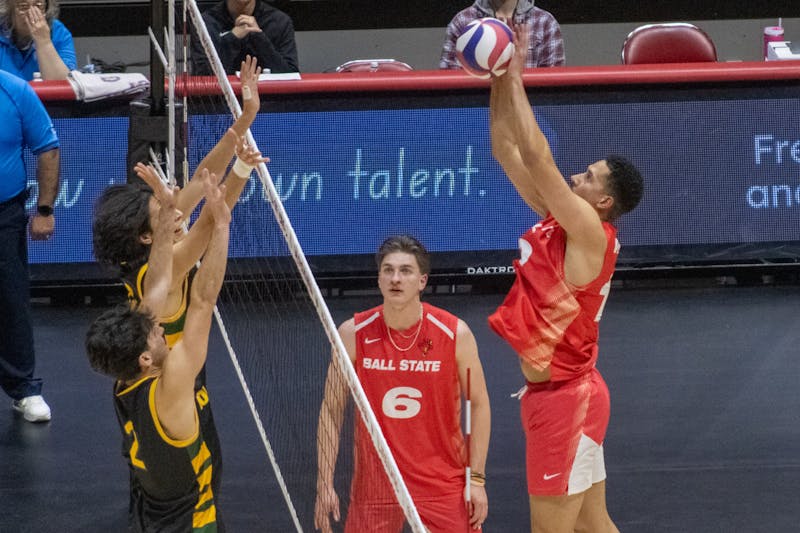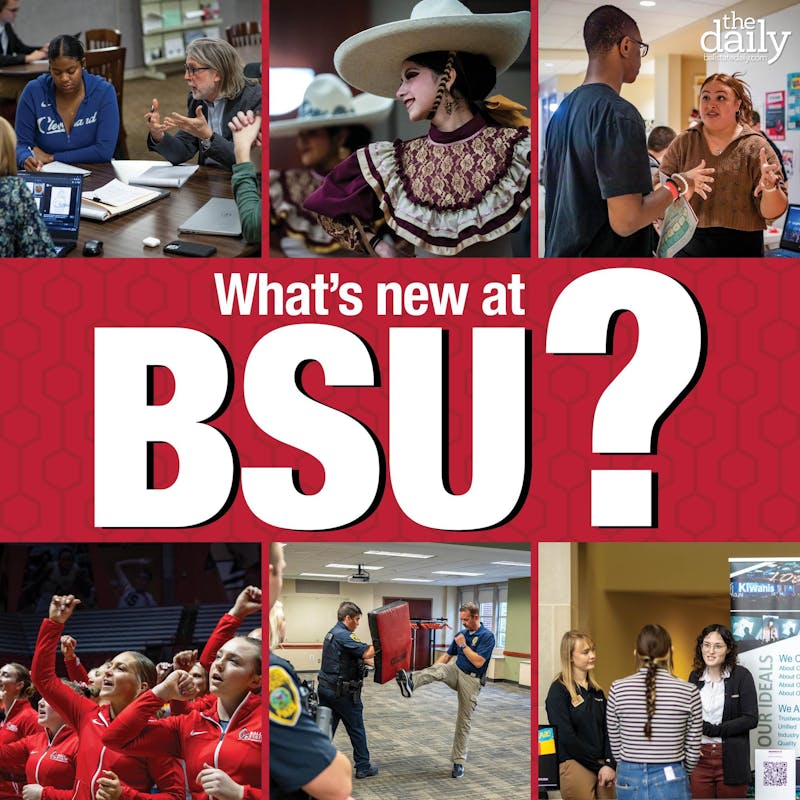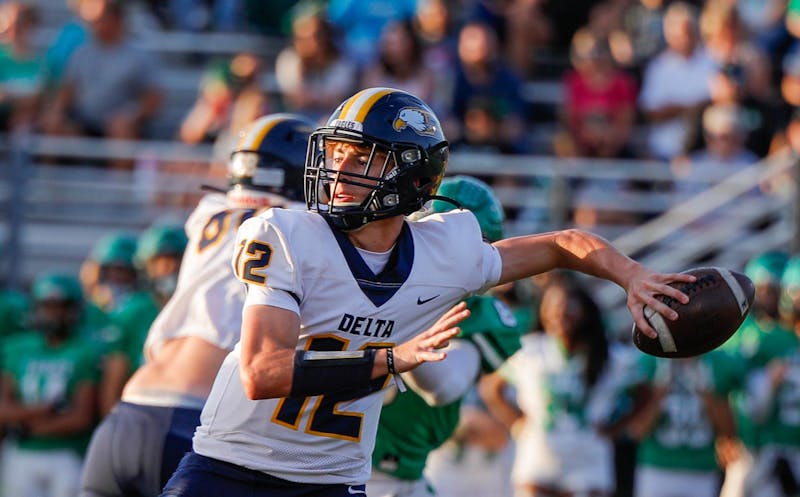The Gassensmith & Lindstrand administration, consisting of Joseph Gassensmith and Monet Lindstrand, was in charge of Ball State University’s Student Government Association (SGA) for the 2023-24 academic year. The pair served as president and vice president.
Their campaign platform promised sustainability, campus and community safety and sexual assault awareness — among other things.
The Daily News completed its yearly evaluation of how the administration delivered on its promises.
Commitment to Sustainability: Mostly Complete
What was initially said:
Gassensmith and Lindstrand aimed to maintain a strong partnership with the university’s dining services by continuing the Student Dining Advisory Board. They also intended to switch to 100% biodegradable containers and flatware in dining halls to reduce unnecessary plastic waste, and they sought to introduce more diverse options for people with dietary restrictions.
Their most significant goal was to enhance their commitment to sustainability by ensuring that for every tree cut down on campus, two new ones were planted in its place.
“With all of our involvements in dining and sustainability groups, it is so important to this team that we continue involving students’ voices in all aspects of sustainability,” Chief of Staff Katrina Leming said via the administration's Instagram page.
What happened:
The administration continued the Student Dining Advisory Board under SGA. Lindstrand said they maintained a strong relationship with Karen Adkins, the senior executive director of auxiliary services for university food, beverage, conference services and special events.
Adkins spoke at a senate meeting in March to discuss sustainability initiatives concerning university dining. Adkins also attends most senate meetings to hear what students say about university dining and answer any questions they may have.
As the former head of the Student Dining Advisory Board, Lindstrand invited senators and outside students passionate about sustainability concepts to attend meetings and share their opinions.
“The new rotation station in the Atrium, when they introduced that, they ensured all of their products were completely biodegradable,” Lindstrand said. “ That’s a conversation we had in those meetings…”
While the administration could not introduce any new dining options for people with dietary restrictions, they did work on getting better signage for the gluten-free snacks specifically.
“[Dining services are] working on a color coding system starting in the fall, where it will be clearly indicated [which] allergens are in different products and a section labeled for those snacks,” Lindstrand said.
Regarding campus greenery, Gassensmith said they adapted. After talking to Vice President of Student Affairs Ro Anne Royer Engle, Gassensmith learned Ball State’s tree canopy is overplanted with a lot of younger trees.
“Instead, SGA purchased five new trees that are going to be planted on campus with a plaque denoting they were purchased by the SGA executive board,” Gassensmith said.
The trees will be planted in the fall when Ball State typically does most of its landscaping for the new school year.
Diversity, Equity, and Inclusion (DEI): Somewhat Complete
What was initially said:
Gassensmith and Lindstrand set out to fund Multicultural Center programs focused on intersectionality and revitalize the identity button campaign with the Health, Promotion and Advocacy Office to encourage open conversation around pronouns and sexuality.
They also wanted to create a Student Diversity Commission to address DEI concerns across campus.
“It is important that we ensure our campus community is inclusive and equitable, as all students should feel welcomed in every space,” Lindstrand said via their administration's Instagram page.
What happened:
Gassensmith said that the Multicultural Center did not need SGA’s funding after all.
“We let [the center] know we’re always a consistent partner if they need us for funding or otherwise,” he said.
Chief Administrator of SGA Taylor Perry headed up the identity button campaign once each semester.
“At its core, it was just a tabling event, but SGA funded and made buttons with every identity that we could research or think of and gave them out to students so they could wear their identity and be proud of it,” Gassensmith said.
Gassensmith said the creation of a Student Diversity Commission “was not as accomplished as I wish it would have been.”
Instead, the cabinet worked with their Secretary of DEI, Rileigh Lancaster, whose position already included many of the responsibilities the commission would have had.
Transformative Disability Awareness: Incomplete
What was initially said:
Gassensmith and Lindstrand wanted to encourage professors to record all lectures so students who struggle with focusing in the classroom could refer to a recording to review class material.
In addition, they wanted to require all presentations and videos to utilize close-captioning and ensure all coursework instructions were provided verbally and in writing.
“Disability awareness is something that must be taken seriously on our campus,” Gassensmith said on the administration's Instagram page.
What happened:
While SGA did receive endorsements for these points from Disability Services and the Office of the Provost. Gassensmith said the ideas did not pass Ball State’s Faculty Council, the governing council comprised of professors and academic faculty.
Sexual Assault Awareness: Somewhat Complete
What they initially said:
Gassensmith and Lindstrand aimed to expand the Angel Shot initiative, which allows women to discreetly signal a bartender or server when they feel unsafe or threatened.
Their administration also wanted to initiate discussions about sexual assault issues with residence halls through partnership programming and provide informational materials about the “Red Zone,” the period of time between the first-day students arrive on campus and Thanksgiving break when most sexual assaults occur, according to the National Center on Safe Supportive Learning Environments.
More significantly, Gassensmith and Lindstrand wanted to increase SGA’s partnership and support with various organizations to expand the scope of “Take Back the Night,” an event on campus where survivors of sexual assault can share their stories during sexual assault awareness month in April.
What happened:
Gassensmith said they did not progress with the Angel Shot initiative because the Black Student Association (BSA) already completed this initiative.
While the administration could not work directly with the residence halls through partnership programming, they did have the opportunity to meet with Anna McGee from the Victim Advocacy Office.
Lindstrand said they discussed providing more resource materials to students through better advertising strategies. The administration expanded conversations with the residence hall representatives from the on-campus caucus to ensure they were communicating well with students about campus-offered resources.
Campus and Community Safety: Somewhat Complete
What was initially said:
Gassensmith and Lindstrand set out to help Fraternity and Sorority Life (FSL) chapters raise funding for Blue Lights on Riverside Avenue and expand the number of existing Blue Lights on campus overall.
They also wanted to increase lighting in dark areas of campus, such as Anthony Apartments, Riverside Avenue and University Green.
What happened:
Gassensmith said SGA could not help FSL chapters raise funding for the placement of Blue Lights due to the legalities of how the governmental budget is categorized.
Instead, SGA designed a safety awareness sign with marketing and communications to be placed both on and off campus to make students aware of contacts available in emergencies.
He said the signs will start appearing on campus over the summer.
Transportation Solutions: Somewhat Complete
What was initially said:
Gassensmith and Lindstrand wanted to add a second blue loop bus route to Ball State’s campus and focus on providing students with more micro-transportation solutions across campus, such as more bike racks and scooters across campus and implementing a bike share program, with additional bus stop shelters.
“A diverse selection of environmentally friendly options for both students and staff will decrease our carbon footprint while providing students with an easier and more convenient way to get around campus,” Leming said.
What happened:
With budgets, and a cost amounting to about $40,000, adding a second blue loop bus was not possible for the Gassensmith & Lindstrand administration.
Instead, they put fresh paint and scraped the rust off of several bike racks on campus, including the north neighborhood and areas by the quad.
As far as scooters go, Gassensmith said that Ball State is “not going to be a scooter school.”
He said scooters involve a lot of liability, as they can present an accessibility hazard for those who use wheelchairs when left all over campus.
Regarding the bike share program, the administration had to turn this idea into more of a research point. Gassensmith said they submitted a research proposal to Business Affairs, which the office is currently reviewing.
SGA successfully got a bus stop shelter placed at the bus stop near Bracken Library on McKinley Avenue in March.
SGA came up with the idea, found some places they thought would work well, and submitted the idea to facilities, planning and management. Though past SGA executive boards introduced this idea, Gassensmith said his administration was the first to allocate funding for it.
“It was easier than we thought it was going to be,” Gassensmith said.
Student Employment and Wages: Somewhat Complete
What was initially said:
Gassensmith and Lindstrand set out to continue working with the SGA Fair Wages Commission.
This included expanding the Fair Wages Commission to include more non-SGA members and recognizing the progress that has already been made with the creation of new wage levels.
Their primary focus was allowing students to work more than 20 hours per week.
What happened:
This year, the Fair Wages Commission Gassensmith established was renamed the Employment and Wages Commission in March.
“That way, it could also serve to act as an advocacy group for student employees if they need it,” Gassensmith said
However, most of their work was research. Gassensmith said, "It’s going to take time for Ball State wages to continue to rise.”
Diversity in Senate: Mostly Complete
What was initially said:
Gassensmith and Lindstrand aimed to ensure the Vice President and the President Pro Tempore work closely with the Secretary of Diversity in recruitment efforts for SGA with a priority on recruiting students from different backgrounds to ensure the senate is representative of the campus student body.
They also wanted to expand the organizational caucus to include more diverse student organizations.
What happened:
Lindstrand said former President Pro Tempore Brenna Large was their “primary refigure for student senate.”
“She’s really worked hard to kind of reach out to different organizations that we typically don’t reach out to,” Lindstrand said.
Large was able to contact almost all of Ball State’s student organizations, including smaller ones and multicultural ones.
Lindstrand said the purpose was to see if any members were interested in joining the senate or surveying to collect information for potential senate projects.
SGA could not recruit any new organizations for the caucus.
Lindstrand said this is due to recurring issues with retention for the last couple of years since all students had to switch to online school during the COVID-19 pandemic.
“We were able to ensure that all of our current seats were filled, which is super exciting because we usually struggle with that,” Lindstrand said.
When recruiting students from different backgrounds, Lindstrand said they focused on recruiting for the off-campus caucus and filling the residence hall seats because they “provide a perspective that’s a lot different than students who maybe are just joining the at-large caucus.”
Lindstrand said to keep things accessible for students at senate meetings, they keep all of their presentations visual while also ensuring there are open conversations with senators about whatever accommodations they may need.
For senator DEI training, SGA hosts a presentation every semester with a representative from the Multicultural Center.
Beneficence Swipes: Incomplete
What was initially said:
Gassensmith and Lindstrand's program idea would allow students to donate unwanted/unused meal swipes to provide vouchers for those in need.
“Food insecurity is a prevalent issue on our campus and something must be done to support our peers that are struggling with this,” Lindstrand said via their administration’s Instagram page.
What happened:
SGA was unable to fulfill this program. Lindstrand said it’s a “very long-term project,” but the Student Dining Advisory Board will “keep in mind moving forward.”
Gassensmith said they pivoted this campaign point to address all food insecurity. To help with this, they could allocate more of their budget to Cardinal Kitchen, a food pantry on campus that SGA initially started.
Contact Meghan Braddy with comments via email at meghan.braddy@bsu.edu or on X @meghan_braddy





The Daily News welcomes thoughtful discussion on all of our stories, but please keep comments civil and on-topic. Read our full guidelines here.